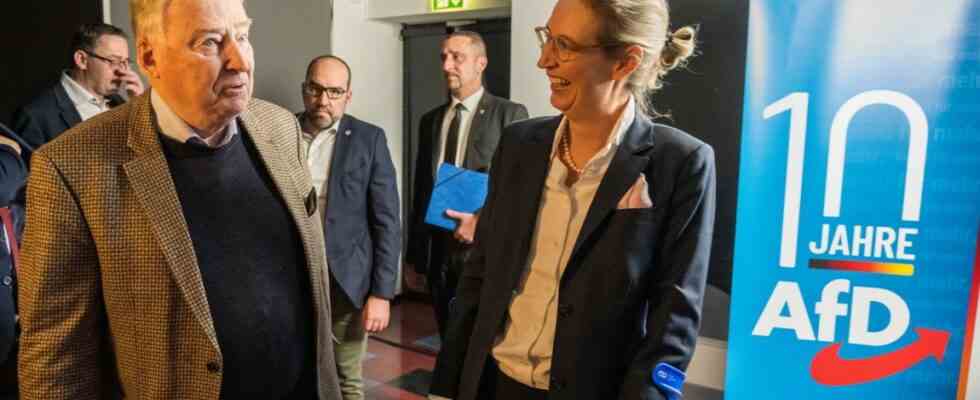As Alice Weidel puts it, the AfD is bursting with strength. She is relentlessly striving for power, saying that the Union’s refusal to form a government alliance will not last. “We have achieved a lot and prevented a lot,” says the AfD boss. “We don’t just want to have a say, we want to help shape and govern.” What you say when you are treated as a pariah by all other parties and no one wants to submit a joint proposal to the Bundestag with you.
Königstein near Frankfurt, the AfD invited on Monday evening to celebrate its tenth anniversary. Outside, demonstrators wave flags from the DGB and the Jusos Hessen Süd and call out “Nazis out”, older women wear stickers “grandmas against the right”. Inside, in the “House of Encounters,” the party leadership and around 300 supporters have gathered to celebrate the anniversary.
The foundation marks a new danger for many
A wonderful success story for the speakers here, because they now sit in the Bundestag and almost all state parliaments, only in Schleswig-Holstein have they been kicked out again. For the protesters outside and many others against it, 2013 was the starting point for a brutalization of the political culture and for a new threat to democracy.
A few kilometers away, in Oberursel, the economics professor Bernd Lucke, the publicist Konrad Adam and 16 other men met in 2013 to found the Alternative for Germany (AfD) in the community hall of the Christ Church there. What unites them is their anger at the Euro and Greece policies of the parties in the Bundestag. In the meantime, only a few from back then are still in the party, including ex-party and parliamentary group leader Alexander Gauland. The others left or died.
They had had enough of the parallel world of the AfD, which also came to life that evening. In this world, the AfD is the only party that still defends the social market economy, as co-party leader Tino Chrupalla says. In this world, the AfD is the reason why there is still freedom of expression in Germany, as Gauland said a little later. And it is the only party that is relentlessly addressing problems caused by immigration and is doing something about what Alice Weidel calls the “migration catastrophe”.
The CDU takes on the role of the desired partner, whom the AfD wants to force into an alliance with the AfD. That will come, first in the east, where the AfD is already the strongest political force, then in the west. This is how Chrupalla outlines it. John Csapo, a member of the Hessian AfD state board, is sitting in the audience. Csapo says that the CDU is still letting the AfD bounce off completely. But this wall could crumble in Thuringia, because the AfD is particularly strong there. It could start with a toleration of a CDU or CDU-FDP government. “I guess it will take another six to seven years,” says Csapo.
If you take the applause as a benchmark, you can see in the hall what the AfD supporters are particularly concerned about. There is, of course, the asylum policy that the party wants to redesign from scratch. “It’s been enough for a long time,” says Tino Chrupalla to applause. The consideration for transsexuals, transgenders and others outside of the classic gender order is also a source of excitement here. “We still know from biology class that there are only two sexes,” says Gauland – and reaped the loudest cheers of the evening.
The AfD has not become radicalized, the CDU has become the third left, “supposedly bourgeois party,” says former CDU member Gauland. The AfD was not founded to create another republic, but to preserve the old one. One can only conclude from the speeches of the evening: if this republic ever existed, it must have been a long time ago.

